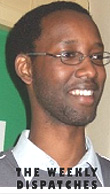As Rwanda marks Genocide week and the country mourns for all the innocents who perished, I find myself at a loss for words. The genocide is such an earth-shattering event that it transcends words. What can you say that hasn’t already been said? How can you even attempt to address or even comprehend the enormity of such a tragic event?


As Rwanda marks Genocide week and the country mourns for all the innocents who perished, I find myself at a loss for words. The genocide is such an earth-shattering event that it transcends words. What can you say that hasn’t already been said? How can you even attempt to address or even comprehend the enormity of such a tragic event?
In many ways the Genocide exists in a place which words can never actually capture, and of the living only the survivors will ever truly know what that is like.
It is hard to really wrap your mind around the concept of genocide. Man has been killing man since time immemorial, but an attempt to wipe an entire group of people off the planet takes this ancient bloodlust to its full horrifying conclusion.
It’s a manifestation of our most primitive instincts and a reminder that even in our modern world, humanity is still connected to a deep, dark reservoir of evil.
We saw it in Armenia at the turn of the last century, with the Holocaust in the 1940’s and in Cambodia in the 1960’s not to mention the genocide that followed the break-up of the former Yugoslavia.
We like to think we live in enlightened times but life tends to give us brutal reminders that our notions may be greatly exaggerated.
And then came Rwanda in 1994. Savage butchery and mass suffering beyond measure were beamed around the world but as we all know, the cavalry never arrived- on the contrary, it was heading in the opposite direction.
Rwanda was the final proof that the world had not learned any lessons from the past. Feeble and empty words conveying empty political platitudes were all the world had to offer.
Ordinary people around the world shuddered in their sofas and changed the channel. The world to all intents and purposes carried on as if nothing really significant was happening and everyday the killings went on relentlessly.
I remember reading a quote on the cover of a magazine ‘There are no devils left in hell’ an aid worker said ‘They are all in Rwanda.’ But this wasn’t a theological battlefield. Even though the genocide was an act of unimaginable evil, it was man killing his fellow man.
Today we repeat the words ‘Never Again’ but I am pessimistic about any notions that age of genocide is over. After all, we have had another genocide in the Television age-Darfur.
The media have already moved in, but it still lingers in the memory and its chilling to hear the same platitudes for Rwanda repeated in Sudan before the world hurries on.
It is a grim irony that in an age in which the world is interconnected as never before, mass killings are still very much a part of our way of life. From Gaza to Sri Lanka, we are much the same world as we were before 1994.
The post-genocide age doesn’t look particularly different from the past.And even the creation of the United Nations Tribunal for Rwanda-and its counterpart in The Hague dealing with Yugoslavia- marked only a hesitant and ultimately mismanaged step forward for the cause of justice.
An optimist could argue that the Court has been a success having tried more than 30 people and laid down important legal principles for international law. However its legacy can charitably be described as a mixed one.
In Arusha, the quest for justice was hijacked by grandstanding defence lawyers and a shameful refusal by the Court to recognize and acknowledge the genocide until more than decade after the Court was set up. The Court became a grotesque theatre lumbering forward with an astonishing lack of speed.
It was widely seen as an expensive gravy train riddled with inefficiency and staffed with posturing lawyers more concerned with attacking the Government of Rwanda and bullying witnesses than actually doing their jobs.
Indeed in the justice sphere, it is Rwanda that has led the way with Gacaca which has done what any such system worth its’ salt should actually do- deliver justice.
With a tiny fraction of the resources boasted by the UN, it has achieved significantly more with a traditional justice system than what that Tribunal could ever have hoped to achieve.
The fact that Rwanda eventually rose from the ashes and achieved such a remarkable degree of success is astounding. However no amount of success will ever free Rwanda from its past and from its’ tragic memories.
As we reflect on that period, let us mourn those who were so cruelly taken from us and hope for a better future for mankind. Ultimately one of the sad lessons from the genocide- bleakly evident in Darfur- is that you cannot count on human compassion from the rest of the world to trump political lethargy and public apathy. It’s not a truth that is easy to swallow, but its one we must acknowledge.


